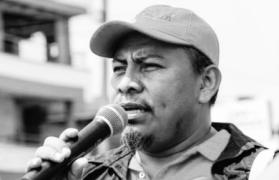Campaign Updates Part 3: Grand National Alliance
This is the 3rd blog entry in a 4-part series of campaign updates on the five tickets running in the February 2, 2014, presidential elections in El Salvador. Election Day is still eight and a half months away, and the four-month campaign period when candidates can officially ask the population to vote for them doesn’t begin until September 24th. But the five different parties that have announced they will participate in the 2014 elections are already reaching out to the population through appearances in communities, popular consultation processes to develop their campaign platforms and with TV, radio and newspaper appearances.
Click here to read a previous update on the FMLN campaign. Click here to read a previous update on the ARENA campaign.
The right-wing GANA party, which was formed by ARENA legislators who left the party, has seen a steady climb in the popularity of their presidential candidate and former president Tony Saca who was kicked out of the ARENA party. The media mogul has launched himself back into the public eye with frequent television and radio appearances and murals of him all over the country’s highways.
Saca’s campaign promises to increase social investment, creating new opportunities for youth and women especially. He has committed to continue many of the Funes administration’s most popular social programs and even expand them. Many critics question how he can run on these promises when his previous presidency shows that this is not how he governs. Saca has also come out against the gang truce, facilitated by the Funes administration, that has substantially reduced the country’s murder rate.
The former president’s new party GANA launched his candidacy along with two smaller right-wing parties, the National Conciliation Party (PCN) and the Christian Democrat Party (PDC), in what they call the UNIDAD coalition. Saca performs better in public opinion polls than any of the three parties, prompting legislators from GANA, the PCN and the PDC to push to reform electoral law so that voters use ballots with the name and photo of candidates rather than just the flags of the party participating in the election, as is currently done.
The campaign highly publicized its “grassroots” organizing efforts centered around “Casas de UNIDAD” (Unity Homes), that were supposedly spontaneous manifestations of support for the candidate and community campaign organizing spaces that were springing up in neighborhoods across the country. However, a recent investigative report by an online digital new source showed that many of the 125 community campaign headquarters were not even functioning, and were typically the home of a local political ally.
Saca’s candidacy has already been called into question by a Supreme Court case that questions whether it is constitutional. The Salvadoran Constitution has somewhat ambiguous language regarding presidential reelection, with Article 152 implying that only consecutive terms are prohibited and Article 154 stating a person cannot serve as president any amount of time longer than one term.

 "I am a CISPES supporter because continuing to fight for social justice and a more people-centered country means continuing the dream and sacrifice of thousands of my fellow Salvadorans who died for that vision.” - Padre Carlos, New York City
"I am a CISPES supporter because continuing to fight for social justice and a more people-centered country means continuing the dream and sacrifice of thousands of my fellow Salvadorans who died for that vision.” - Padre Carlos, New York City

